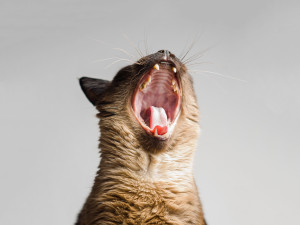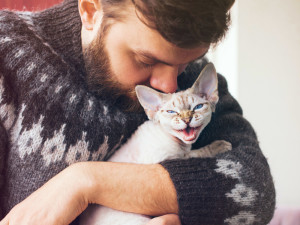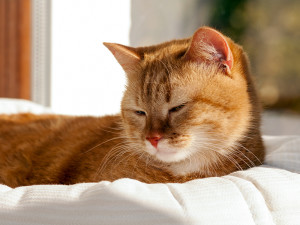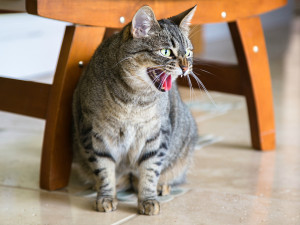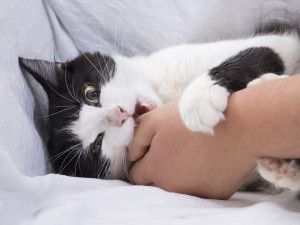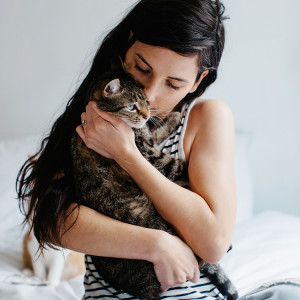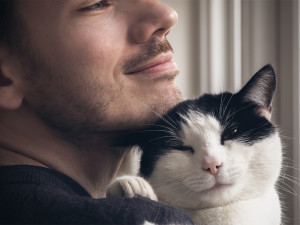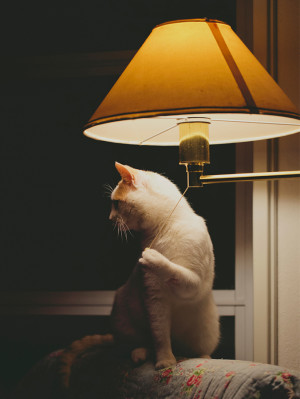Why Does My Cat Meow at Night? (And How to Prevent It)
Just a small request to lower the volume, please.

Share Article
In This Article:
Why is My Cat Meowing All Night? How to Stop a Cat From Meowing All Night When to Seek Professional Help for Your Cat
If you’ve ever been jolted awake by your cat’s persistent meowing in the middle of the night, you’re not alone. Some cats are known for their nocturnal vocalizations, which can be caused by various factors, including hunger, boredom, loneliness, stress, or even underlying health issues.
Further, it seems like there’s just no reasoning with cats. Even though you explain to them that meowing at 3 a.m. is not appropriate and consider taking action (like — gasp! — closing them out of the room), your little opera singer refuses to listen. So, how do you change the behavior of a stubborn, persistent kitty?
The first step is to understand why cats meow at night in the first place. Once you figure out the why, you can then work on the how of behavior modification.

Why is my cat meowing all night?
Cats meow to communicate with humans, and they have a large repertoireopens in new tab of chirps, yowls, mews, squeaks, and chatters. There are several reasons your cat is meowing at night. Contrary to popular belief, cats are not nocturnal animals; they are crepuscular, which means that they are most active in the dawn and dusk hours.
Yes, cats are light sleepers and take several little naps throughout a 24-hour day. However, your cat should not be awake all night. Your cat is likely meowing, because they have a need that has been unmet, and they want you — their parent — to help them get that need fulfilled. Let’s take a look at a list of demands, about which your chatty cat might be vocalizing:
Health issues
This is an important one, especially as your cat gets olderopens in new tab, and it’s always a good idea to rule out medical reasons for excessive or increased vocalization. Several conditions, like hyperthyroidism, hypertension, and cognitive declineopens in new tab can cause meowing, along with pain and discomfort (did you know that cats as young as six years old can start to develop arthritis?). A veterinarian can help you determine if pain or discomfort, or some other health concern is an issue.
Boredom or understimulation
Medical issues aside, this is a very common reason why cats meow at night. If you have an indoor-only cat, there’s a good chance that they’re bored (at least some of the time). Playtime that includes simulated hunting is essential to a cat’s happiness! Cats are predators at heart, and if they’re not given the opportunity to hunt their prey and express the prey sequence (staring, stalking/chasing, pouncing/grabbing, and kill biting), they can become bored, depressed, stressed, and/or anxious.
Hunger
Does your cat meow at night because they’re hungry? Cats do best when they get multiple small meals throughout the day, including one just before bedtime. Hunger can cause wakefulness, and nothing is more disruptive than a hangry cat who’s on the prowl for a snack to curb their tummy growls.
Attention-seeking behavior
Some cats require more attention than others, but all cats still require some attention. Contrary to popular belief, cats do have social needs! So, if you haven’t spent some time interacting with your cat recently, it might be a good idea to specifically make time every day for some kitty cuddles or play sessions.
Stress or anxiety
If you’ve ever been stressed or anxious about something, you know how it can keep you up at night. Well, cats get stressed and anxious, too. Is there something that has changed in your household that could be bothering your cat? A new pet, furniture arrangement, or schedule change? Loud noises that might be happening regularly but at random times? Or does your cat have separation anxiety? Try to pinpoint any environmental changes and determine if they can be altered, or at least try to acclimate your cat to them.
Territorial behavior
Are there outdoor cats creepin’ around your place at night? If so, your indoor cat might find themselves feeling threatened. Cats can have face-offs through glass at windows and doors, which includes — you guessed it — lots of meowing.
Mating behavior (in unaltered cats)
If you have a cat that is not spayed or neutered, hormones may be the reason for your cat’s night-time meowing. Female cats in heat can meow to try to get outside, and male cats can caterwaul to locate mates when they sense a female in heat is in the area.
How to stop a cat from meowing all night
Some people view meowing at night as a battle of wills, but I encourage you to set your ego aside and try to figure out what your cat needs. You are responsible for meeting your cat’s needs; they can’t do it themselves; this is true particularly if there’s a medical issue that needs to be addressed. Once you figure out why your cat is meowing at night, it may be easy (and often fun) to remedy the situation.
Consistent bedtime routine
One of the primary reasons cats meow all night is because they are bored or didn’t get an opportunity to be a cat that day. Remember how I mentioned that cats are crepuscular animals? They tend to hunt (and therefore eat) more frequently in the dawn and dusk hours, when their prey are most active, too. So give them a hunting session in the evenings before you go to bed.
The best toy to allow a cat to fulfill all steps in the prey sequence is a long wand toy (short wand toys are garbage for this — get yourself something like the Da Birdopens in new tab, which is almost six feet long). Put something on the end of the wand toy that resembles an actual prey item, like feathers (for a bird), a mouse, insect, or snake lure. Then, pretend to be that type of prey and take your cat through the prey sequence for 10 to 15 minutes. After that, give your fearsome hunter some food; this will keep the hunt-eat-groom-sleep sequence going, and settle your cat down for the night.
Comfortable sleeping environment
Another thing that can help cats settle in for the night is to, well, give them some place to settle. Did you know that cats have a much higher thermoneutral zone than humans do? The thermoneutral zone is a range of temperatures where no extra energy is needed to either heat up or cool down.
For humans, that range is between about 68 and 72 degrees Fahrenheit. For cats, it’s between about 83 and 100 degrees. So, get your cat a heated cat mat to put under their favorite bed! That will help them feel comfy and cozy all night long.
Positive reinforcement
Positive reinforcement can be a double-edged sword when it comes to a cat’s persistent meowing. Positive reinforcement means that you do something that encourages a particular behavior, and this includes things like talking back to your cat when they meow or giving her pets or food when the midnight meowing sets in.
Congratulations — you’ve just reinforced that meowing behavior… you’ve taught your cat that if they meow, they get food, love, or attention, etc.! So, be very careful about the behaviors that you’re reinforcing. Now, if your cat is meowing and you pet/praise them after they become quiet, you’re reinforcing quiet behavior. That’s the way to do it!
When to seek professional help
If you’ve tried adjusting your cat’s inner hunting clock by providing pre-bedtime play sessions and meals, and have done everything else you can think of, it’s time to call in a professional. You should absolutely talk with your veterinarian if you notice any sudden behavior changes, and that includes meowing at night (if your cat was quiet before).
But you can also get assistance from certified cat behavior consultants and behaviorists, who can help you identify what is going on and how to remedy the situation. So, reach out for help; there’s no need to suffer in silence (or in this case, suffer to the soulful sounds of your tone-deaf cat).
FAQs (People also ask):
Why does my cat meow so much?
There are many reasons your cat could be meowing. First off, do you have a chatty breed? Breeds like Siamese, Bengal, and Japanese bobtail cats are more vocal than the average cat. Other reasons for meowing include health issues and pain, or having a need that is not being met (ie., food, attention, playtime, etc.).
Why does my cat act wildcrazy at night?
Once the natural daylight fades, the party starts for many cats. That’s because cats are crepuscular animals; they are most active around dusk and dawn. This is when they may start running around the house (i.e., get the “zoomies”), or yowl loudly while carrying a favorite toy in their mouth.
Should I let my cat sleep with me?
Letting your cat sleep with you is a highly personal choice that depends on you and your cat. If you enjoy sleeping with your cat, by all means, let the nighttime cuddle fest commence.
References:

Marci Koski
Marci Koski fell in love with cats as a toddler and never looked back, even leaving a career as an endangered species biologist for the U.S. Fish and Wildlife Service to start her own cat behavior consulting service, Feline Behavior Solutions in 2014. Since then, Marci has been helping people resolve their cat behavior issues by teaching people “how to cat” — namely, how to give their cat the resources and environments they need to thrive with their human companions.
Marci has a PhD in Fishery and Wildlife Biology, and earned her specialized and advanced Feline Training and Behavior certifications through the Animal Behavior Institute.
Related articles
![cat biting person's hand]()
Why Does My Cat Bite Me?
Don’t live in fear of your feline overlord.
![dark-haired woman hugging cat that has imprinted on her]()
10 Signs Your Cat Has Imprinted on You
Feeling like you have a little shadow these days? Here’s why that’s happening.
![kittens licking woman's hand]()
Curious Cat Behavior: Why Does My Cat Lick Me?
Hey, everybody’s got their thing.
![Cat kneading pet parent]()
Why Does My Cat Knead Me?
Among other things, “making biscuits” is a sign of affection. We’re not crying…
![cat snuggling man]()
What’s Your Cat’s Love Language?
Five surprising ways cats show affection (and how you can show it back), according to a cat behaviorist.
![White cat switching on lamp on couch]()
Why Does Your Cat Wake You Up at Night?
You want to sleep, your cat wants to party. Here’s how to deal.

